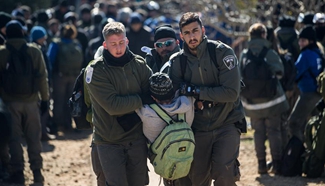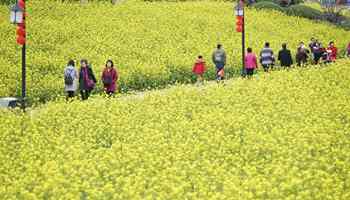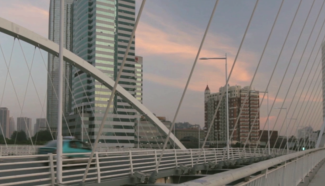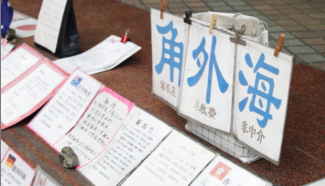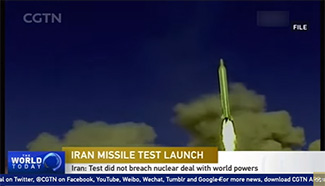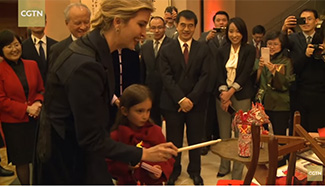BEIJING, Feb. 3 (Xinhua) -- After a tumultus year of 2016, the new year augurs not so well for people in the Middle East. From Syria to Iraq, from Palestine to Turkey, people are struggling for peace and stability.
SYRIA
"We can figure out ways to make power outages bearable, but living without water for over a month is an absolute nightmare!" Nadir Rushdy, a Syrian, said while looking at the empty water tanks in his house.
Since the beginning of 2017, a drinking water crisis has become the biggest problem facing the residents in Syria's capital city of Damascus.
The government said the city's water supply has dropped by 80 percent after extremist groups blew up water pumps of the city's major water sources in December. Millions of people are having water shortages.
The government and the Syrian Red Crescent have mobilized water tankers from other regions to Damascus, rationing water to residents.
Rushdy, in his 60s, had to carry buckets and fetch water with his neighbors every day. "The water is barely enough for our family of five to get by a day, so every drop of water needs to be saved," he said.
Latest news said the Syrian government has recovered the major water sources, and the Damascus water crisis is expected to ease. However, the water crisis has shown how volatile the situation is in Syria.
Sadly, the flames of war in Syria will keep on burning in 2017. As the Islamic State (IS) still takes control of large parts of the provinces of Rakka and Deir Ezzor, and the Jaish al-Fateh, or the Army of Conquest, is in control of much of Idlib, the battle between government troops and the extremist groups will keep going.
Meanwhile, the peace talks between the government and the opposition are also expected to continue. UN Special Envoy for Syria Staffan de Mistura said that Syrian peace talks are expected to be resumed in February in Geneva.
IRAQ
Holding a sniper rifle, Iraqi soldier Saned was targeting a compound of the Islamic State that was less than 100 meters away.
Saned was on the second story of a hotel in the war-torn city of Mosul. Bullet holes and explosion marks on the walls of the hotel serve as a reminder of the miseries and pains the city has undergone.
On Oct. 31, 2016, Iraqi soldiers started a major offensive to retake Mosul, the country's second-largest city and IS militants' last major urban stronghold in the country.
The fighting was ferocious as the army limited the use of heavy weapons to minimize civilian casualties, while the militant insurgents fought back recklessly with car bombs, rocket attacks, and even used civilians as human shields.
After the liberation of its eastern side in January, retaking the western Mosul will certainly be the major task of the Iraqi government.
Meanwhile, the Iraqi political arena is by no means tranquil this year.
Deep sectarian conflicts among Sunni and Shi'ite groups, Kurds and other minority groups will lead to a coalition government of low efficiency.
Besides, international powers, including the United States and Gulf nations, will continue to influence the war-torn country for the sake of geopolitical interests.
The Iraqi government will probably face a reshuffle given the derailed situation nationwide and discontent among the Iraqi people.
TURKEY
"I have never expected 2016 to be so tough," Ferhat Sarp, boss of Azure Cave Suites, a hotel in the Turkish tourist destination of Cappadocia, told Xinhua.
"My hotel saw a plunge in the number of tourists, which was the worst in the last three years," Ferhat said. "All this was because of incessant terror attacks and political turmoil."
In 2016, a total of 31.3 million people visited Turkey, a drop of 25 percent over the previous year, according to latest figures.
A couple of years ago, to grasp the business opportunities brought by Turkey's booming tourism, Ferhat gave up his career in Istanbul and returned to his home province of Nevsehir to run the cave hotel.
Despite the sluggish business, Ferhat never regretted leaving Istanbul, a city now threatened by terror attacks. There, residents are afraid of going to nightclubs and large shopping malls while tourists hardly dare visit places of interest. People even feel nervous at the airport.
Over the past one and a half years, Turkey has been hit by around 30 bombing attacks, in which more than 400 people lost their lives.
In the future, Turkey will continue to face a severe security situation as the Islamic State, the outlawed Kurdistan Workers' Party and the so-called Gulen Movement, now branded as a terror group by Ankara for its alleged role in directing a coup attempt in July 2016, are still threatening state security, according to Ferhat.
The only thing for certain might be a shift to a presidential system in Turkey. On Jan. 21, Turkish lawmakers approved a bill on constitutional changes. If the bill is approved in a national referendum, President Recep Tayyip Erdogan will have dramatically expanded powers to deal with social and security problems.



